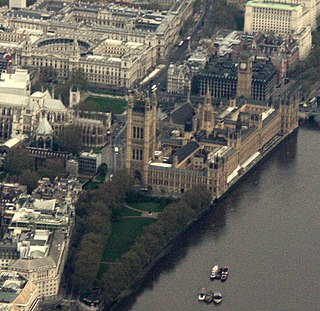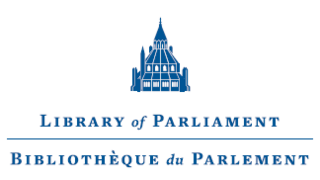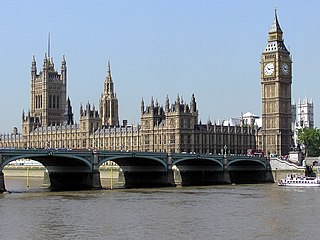
The Parliament of the United Kingdom of Great Britain and Northern Ireland is the supreme legislative body of the United Kingdom, and may also legislate for the Crown Dependencies and the British Overseas Territories. It meets at the Palace of Westminster in London. Parliament possesses legislative supremacy and thereby holds ultimate power over all other political bodies in the United Kingdom and the Overseas Territories. While Parliament is bicameral, it has three parts: the sovereign (King-in-Parliament), the House of Lords, and the House of Commons. In theory, power is officially vested in the King-in-Parliament. However, the Crown normally acts on the advice of the prime minister, and the powers of the House of Lords are limited to only delaying legislation; thus power is de facto vested in the House of Commons.

The Palace of Westminster is the meeting place of the Parliament of the United Kingdom and is located in London, England. It is commonly called the Houses of Parliament after the House of Commons and the House of Lords, the two legislative chambers which occupy the building. The palace is one of the centres of political life in the United Kingdom; "Westminster" has become a metonym for the UK Parliament and the British Government, and the Westminster system of government commemorates the name of the palace. The Elizabeth Tower of the palace, nicknamed Big Ben, is a landmark of London and the United Kingdom in general. The Palace of Westminster has been a Grade I listed building since 1970 and part of a UNESCO World Heritage Site since 1987.

The usher of the Black Rod is an official in the parliaments of several countries of the Commonwealth of Nations. The title is often shortened to Black Rod, and in some countries, formally known as Gentleman Usher of the Black Rod if male, or Lady Usher of the Black Rod if female. The position originates in the House of Lords in the Parliament of the United Kingdom. Equivalent positions also exist in Australia, Canada and New Zealand.

The Parliamentary Estate is the land and buildings used by the Parliament of the United Kingdom.

The Palace of Westminster, the medieval royal palace used as the home of the British parliament, was largely destroyed by fire on 16 October 1834. The blaze was caused by the burning of small wooden tally sticks which had been used as part of the accounting procedures of the Exchequer until 1826. The sticks were disposed of carelessly in the two furnaces under the House of Lords, which caused a chimney fire in the two flues that ran under the floor of the Lords' chamber and up through the walls.

Portcullis House (PCH) is an office building in Westminster, London, England, that was commissioned in 1992 and opened in 2001 to provide offices for 213 members of the Parliament of the United Kingdom and their staff. The public entrance is on the Embankment. Part of the Parliamentary Estate, the building augments limited space in the Palace of Westminster and surroundings.

The Congressional Research Service (CRS) is a public policy research institute of the United States Congress. Operating within the Library of Congress, it works primarily and directly for members of Congress and their committees and staff on a confidential, nonpartisan basis. CRS is sometimes known as Congress' think tank due to its broad mandate of providing research and analysis on all matters relevant to national policymaking.

The State Library of New South Wales, part of which is known as the Mitchell Library, is a large heritage-listed special collections, reference and research library open to the public and is one of the oldest libraries in Australia. Established in 1869 its collections date back to the Australian Subscription Library established in the colony of New South Wales in 1826. The library is located on the corner of Macquarie Street and Shakespeare Place, in the Sydney central business district adjacent to the Domain and the Royal Botanic Gardens, in the City of Sydney. The library is a member of the National and State Libraries Australia (NSLA) consortium.

The Library of Parliament is the main information repository and research resource for the Parliament of Canada. The main branch of the library sits at the rear of the Centre Block on Parliament Hill in Ottawa, Ontario. The library survived the 1916 fire that destroyed Centre Block. The library has been augmented and renovated several times since its construction in 1876, the last between 2002 and 2006, though the form and decor remain essentially authentic. The building today serves as a Canadian icon, and appears on the obverse of the Canadian ten-dollar bill.

The Parliamentary Office of Science and Technology (POST) is the Parliament of the United Kingdom's in-house source of independent, balanced and accessible analysis of public policy issues related to science and technology. POST serves both Houses of Parliament.

The Parliamentary Archives of the United Kingdom preserves and makes available to the public the records of the House of Lords and House of Commons back to 1497, as well as some 200 other collections of parliamentary interest. The present title was officially adopted in November 2006, as a change from the previous title, the House of Lords Record Office.
The House of Commons Enquiry Service, formerly known as the House of Commons Information Office, is a section within the Department of Information Services of the House of Commons. The chief role of the office is to provide the public with information regarding the work, history and membership of the House of Commons of the United Kingdom.

The House of Lords Library is the library and information resource of the House of Lords, the upper house of the Parliament of the United Kingdom. It provides Members of the House and their staff with books, Parliamentary material and reference and research services.
The House of Commons Commission is the overall supervisory body of the House of Commons administration in the United Kingdom. The commission is a corporate body established by the House of Commons (Administration) Act 1978. The commission continues to exist during the dissolution period and the person who was Speaker continues in office as a member of the commission until a speaker is chosen by the new parliament.
The State Opening of Parliament includes a State Procession, a formal display of the Sovereign, dignified by a sizeable entourage made up of Great Officers of State and members of the Royal Household. The State Procession is now confined to the interior of the Palace of Westminster, but in earlier centuries it followed an outdoor route to and from Westminster Abbey.

The Parliamentary War Memorial, also known as the Recording Angel Memorial, is a stone sculpture in Westminster Hall, unveiled in 1922, which commemorates the members of both Houses of Parliament of the United Kingdom who died in the First World War. It names 22 members of the House of Commons, 20 members of the House of Lords, and 9 senior members of staff, together with another 94 sons of members and officers of the House of Commons, who lost their lives in the war. Above the memorial is a large stained glass window which commemorates members and staff of both Houses who died in the Second World War.
David Menhennet CB was a British librarian. As librarian at the House of Commons Library from 1976 to 1991, he oversaw a period of modernisation and other improvements to the library, transforming it into a modern research facility.
The European Parliamentary Research Service (EPRS) is the in-house research department and think tank of the European Parliament, providing research and analytical support to the members of the European Parliament, its parliamentary committees and the Parliament as a whole. It was created in November 2013 as a directorate-general within the Parliament's permanent administration. The EPRS philosophy is to provide independent, objective and authoritative analysis of, and research on, policy issues relating to the European Union, in order to assist Members in their parliamentary work.
Roger Hugh Vaughan Charles Morgan was an English librarian who spent four decades in the Houses of Parliament. He is credited with modernising the House of Lords Library as head librarian from 1977–91.
David Lewis Jones was a Welsh librarian and historian who was the librarian of the House of Lords Library from 1991 to 2006.

















